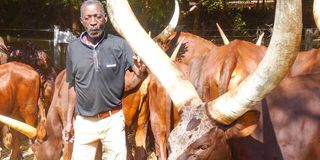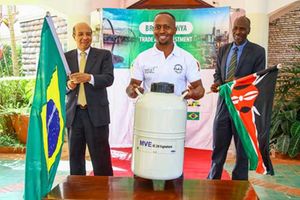
Benedict Maingi, a farmhand at Tharaka University, with Ankole cows.
Near Gatunga market on the Chiakariga-Marimanti-Ura-Gate road is Tharaka University.
Though in a dry region, the institution refuses to allow the conditions around to define it. Instead of complaining, the university that was established as a constituent college of Chuka University in 2015, resorted to ensuring the environment worked in its favour.
It started growing neem trees, which guaranteed a micro-climate that modified temperature, humidity and wind conditions.
Farming then became feasible, transforming the university into the region’s food basket.
The once desert-like region now thrives in crop and livestock production.
“The neem trees have brought many benefits as they help modulate the climate, provide shade for the university fraternity and animals and cool the environment,” Prof Peter K Muriungi, the Vice-Chancellor, says.
“They also absorb pollutants and aid in purifying the air. It needs to be taken into account that neem trees are highly effective in sequestering carbon dioxide from the atmosphere.”
He adds that the trees have transformed the academic life at the institution since the shades provide a conducive environment for learning and reading.
The VC says the neem trees have helped curb soil erosion while promoting conservation.
“They have played an important role in helping us fight the effects of global warming. More than 90 per cent of the tree seedlings produced by the university are neem,” he says.
For sustainable farming and transforming Tharaka University into a bread basket despite the vagaries of climate change, the institution took the decision to conserve every drop of water.
Rain water is harvested in a 20,000,000 cubic litre pan. The water is later used in crop and animal production.
The farming practised at the university maximises production while conserving water.
The water is conserved through mulching, hydroponics and shade-nets, Prof Muriungi says.
The livestock kept by Tharaka University include local goats, cattle and sheep. The local breeds are suitably adapted to the climate of the region.
Zero-grazing ensures maximum yields and fodder usage by the animals.
The community outside employs outdoor grazing, which farming experts say, leads to losses.
There is a special kind of animal on the university farm – the Ankole cow. The long-horned hardy cattle have unique characteristics. The university uses them to improve the local breeds.
Tharaka University Farm Manager in Charge of Livestock, Adan Denge, says the breed is also known as Ankole Watutsi.
“The animals are easy to manage due to their docile nature. They rarely need to be dipped and require little effort to maintain, surviving under stressful conditions. The Ankole cattle can still do well in regions with little water and scarce pasture,” Denge says.
“They also survive in areas known for pests and diseases.”
Tharaka University farm has more than 50 Ankole Watutsi cows. The multi-purpose animals fetch an impressive price due to their qualities.
Denge says they are great beef producers and their milk is rich in nutrients. The university aims to cross them with local zebus and get an even hardier breed for the region. The first generation cross-breed has been a success.
Tharaka University hires locals as farmhands. Other than looking after the animals, they get training on farm practices and value-addition.
“Most of our farm managers started from certificate level and have been advancing. Many now have diplomas, with some already pursuing degree courses in agriculture,” says Tharaka University Marketing Admissions Director James Ndwiga.
The farm has around 100 pigs and 800 caged chickens.
It also produces tomatoes, bananas, cabbages, oranges and other fruits and vegetables. The surplus is sold to the community.
The university plans to begin adding value to its farm produce on a large scale soon.
***************








